Key takeaways
- Ethical subjectivism emphasizes that moral judgments are influenced by individual feelings rather than objective truths, challenging traditional views of morality.
- Engaging with key philosophical concepts promotes personal transformation and deeper understanding, highlighting the need for clear definitions in discussions.
- Research in philosophy requires critical analysis of texts and diverse perspectives, as well as patience to appreciate the complexity of differing viewpoints.
- Practical applications of ethical subjectivism encourage empathy and openness in understanding moral disagreements, particularly in multicultural contexts.
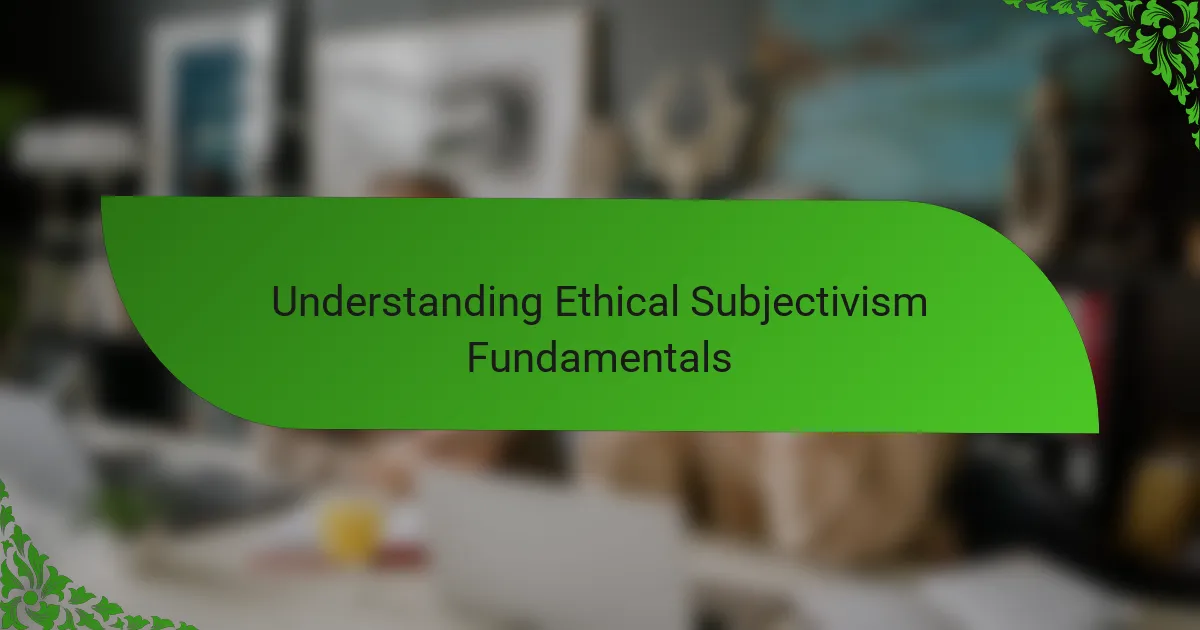
Understanding Ethical Subjectivism Fundamentals
When I first encountered ethical subjectivism, I found it surprisingly intuitive yet unsettling. It suggests that moral judgments are not about universal truths but rather reflect individual feelings or attitudes. Have you ever felt strongly that something was right or wrong simply because of your own perspective? That’s the cornerstone of this view.
What fascinates me most is how ethical subjectivism challenges the idea of objective morality. It made me question if there really is a fixed moral compass or if we’re all just navigating according to our own inner sense of right and wrong. This personal nature of ethics can feel both empowering and isolating at the same time.
In essence, ethical subjectivism asks us to consider if morality is something inside us rather than an external fact. I’ve come to see how this affects not only philosophical debates but real-life interactions, where understanding someone else’s subjective standpoint can change the way we approach moral disagreements. It’s a fundamental shift from “what is” to “what I feel.”
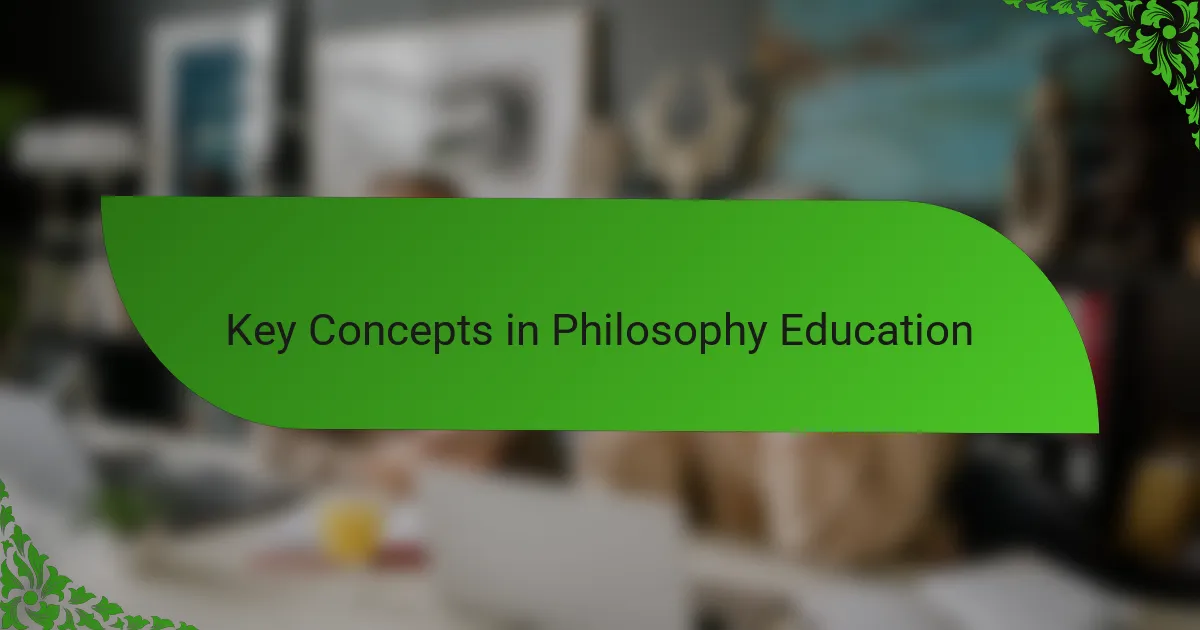
Key Concepts in Philosophy Education
Philosophy education revolves around grasping key concepts that shape how we think and reason. When I first dived into these ideas, I realized they serve as the building blocks for deeper understanding—like ethical subjectivism, which reshapes how I view morality itself. Don’t you find that unpacking these foundational terms helps clarify complex debates?
One concept that stuck with me is the importance of defining terms clearly. I’ve noticed that without precision, discussions can quickly spiral into confusion or miscommunication. For me, drilling down into these core ideas made philosophical conversations more meaningful and less abstract.
I also believe that engaging with key concepts isn’t just an academic exercise—it’s deeply personal. Philosophical ideas challenge our assumptions and invite us to explore our own beliefs. Have you ever been surprised by how a single concept changed your perspective? That’s the kind of transformative power philosophy education offers.
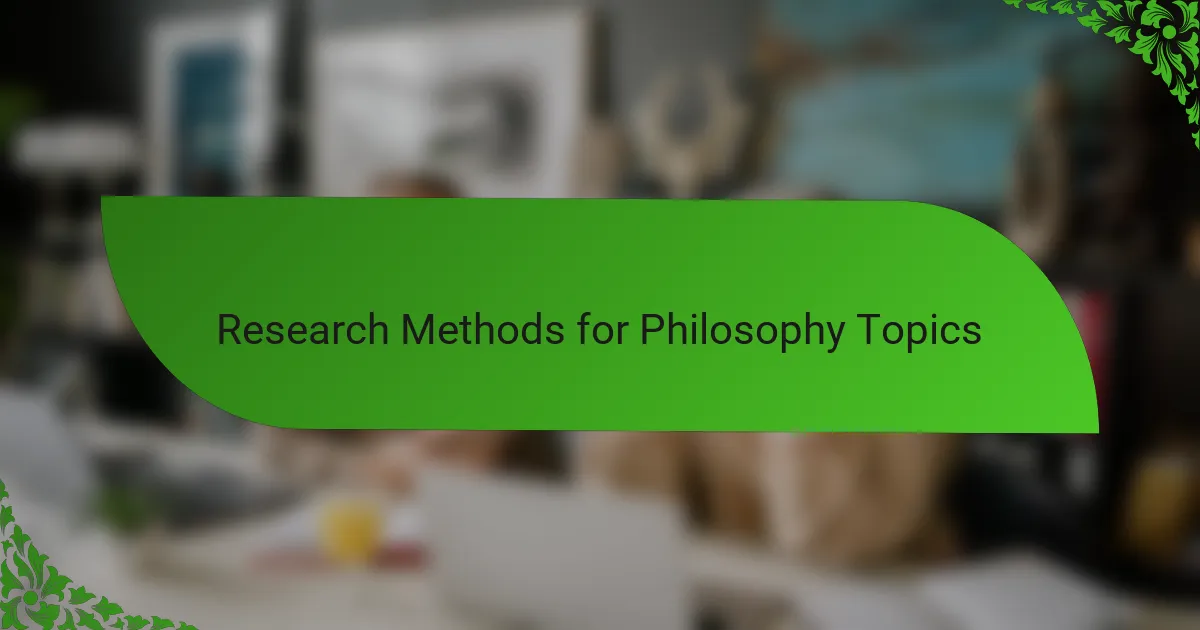
Research Methods for Philosophy Topics
When I started researching ethical subjectivism, I quickly realized that philosophy demands a different kind of investigation than many other fields. Rather than relying solely on empirical data, I found myself exploring texts, arguments, and thought experiments to really grasp the nuances. Have you ever noticed how much weighing different perspectives shapes your understanding more than just facts alone?
One method I found essential was close reading—slowly unpacking philosophical works line by line. It felt like peeling an onion; each layer revealed deeper meaning or raised new questions. This approach helped me connect with the author’s intent and critically analyze the arguments instead of just skim-reading.
I also embraced dialogue, whether through discussion with peers or writing my own reflections. Putting my thoughts into words exposed gaps and challenged my assumptions. Reflecting this way made the research feel alive, turning abstract ideas into something practically relevant. Have you tried debating a philosophical idea out loud? It’s surprisingly clarifying.
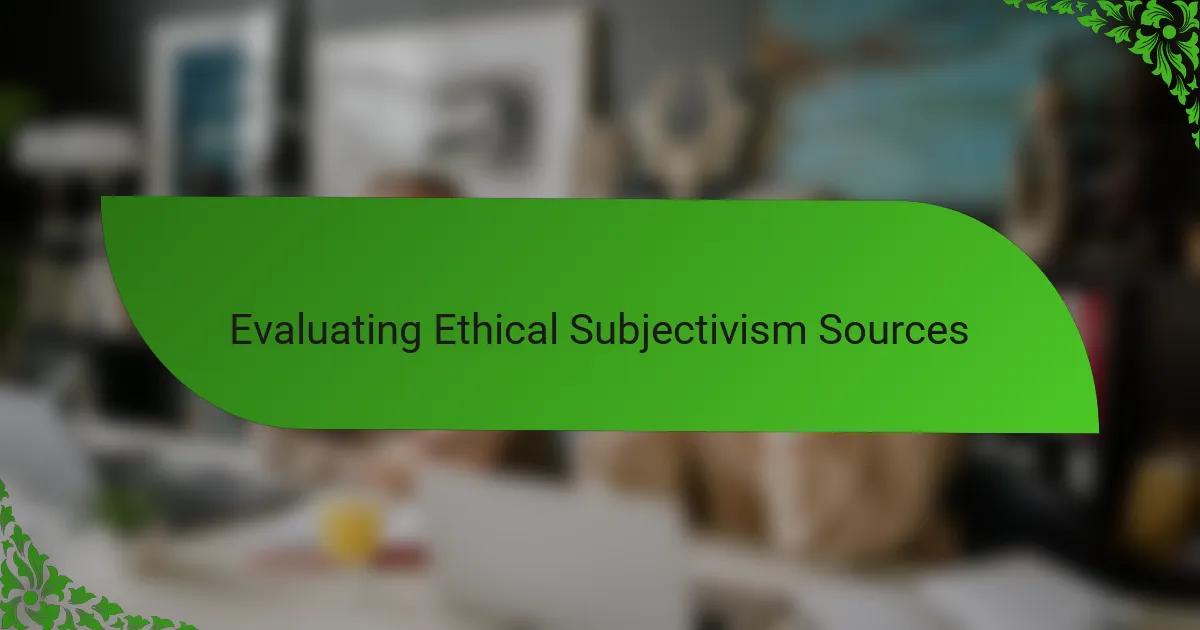
Evaluating Ethical Subjectivism Sources
Evaluating sources on ethical subjectivism was an eye-opening part of my research journey. I quickly learned that not all materials treat the subject with equal depth or fairness; some simply dismiss it without fully engaging its arguments. Have you ever felt frustrated by articles that barely scratch the surface yet make sweeping claims? That pushed me to dig deeper into texts that genuinely wrestled with the nuances.
What struck me most was how important it is to check the author’s background and perspectives. Philosophy can be so diverse that someone’s cultural or philosophical bias can shape how they present ethical subjectivism. I found myself asking, “Is this source trying to explain the theory, critique it, or sometimes even misrepresent it?” This critical stance helped me filter out content that didn’t contribute meaningfully.
I also found it helpful to compare a variety of sources—from academic papers to accessible talks—to get a rounded view. Reading opposing viewpoints side by side revealed subtleties I hadn’t noticed before. That experience reminded me why philosophy isn’t about quick answers but about wrestling thoughtfully with complexity. Have you experienced how multiple perspectives can deepen your understanding? That balance proved essential in my study of ethical subjectivism.
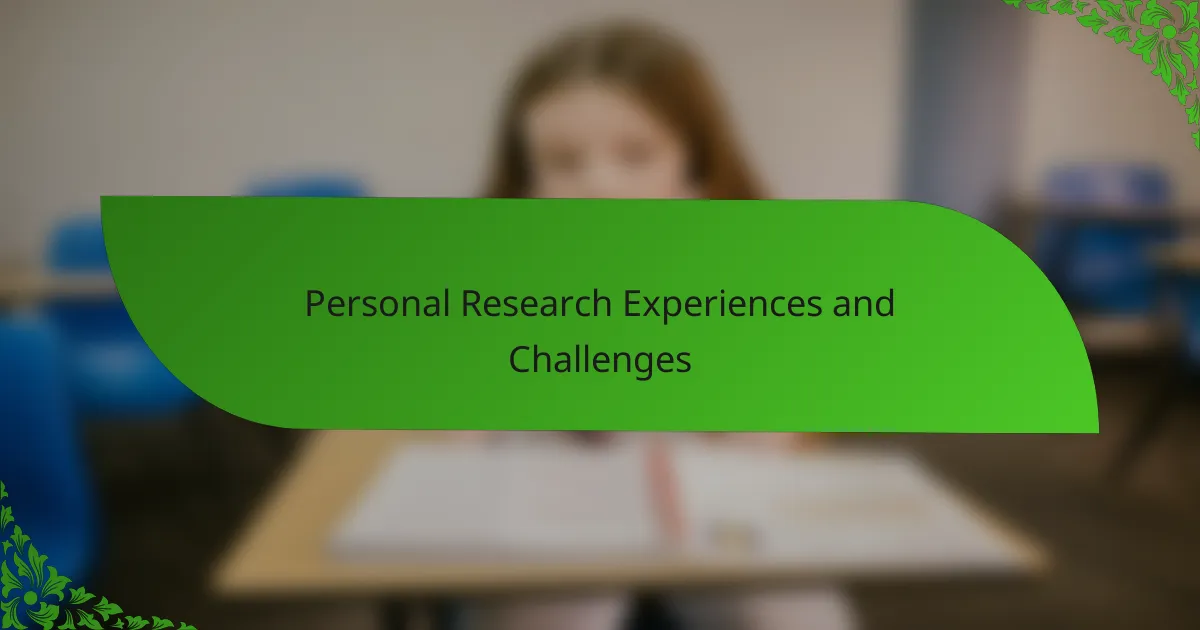
Personal Research Experiences and Challenges
Diving into the research, I quickly faced moments of doubt. Sometimes, I’d read a passage on ethical subjectivism that seemed straightforward, only to realize hours later that I’d misunderstood a key nuance. Have you ever caught yourself confidently explaining something, then discovered your grasp wasn’t as solid as you thought? Those moments were frustrating but also fueled my curiosity even more.
Another challenge was balancing my own instincts about morality with the perspectives I encountered. At times, I found myself resisting arguments that clashed with my personal beliefs, which made me question how subjective my own ethics really were. How do you stay open-minded when your gut feelings keep pulling you in a different direction? I learned it took continual self-reflection and patience to appreciate opposing viewpoints without immediately dismissing them.
Lastly, the sheer volume of interpretations and critiques available was overwhelming. Picking through dense texts and deciding which voices were worth my time felt like searching for a needle in a haystack. There were days when I wanted to throw in the towel, but reminding myself why ethical subjectivism matters helped me push through. Have you ever felt stuck in a research rabbit hole? For me, persistence transformed challenge into meaningful insight.
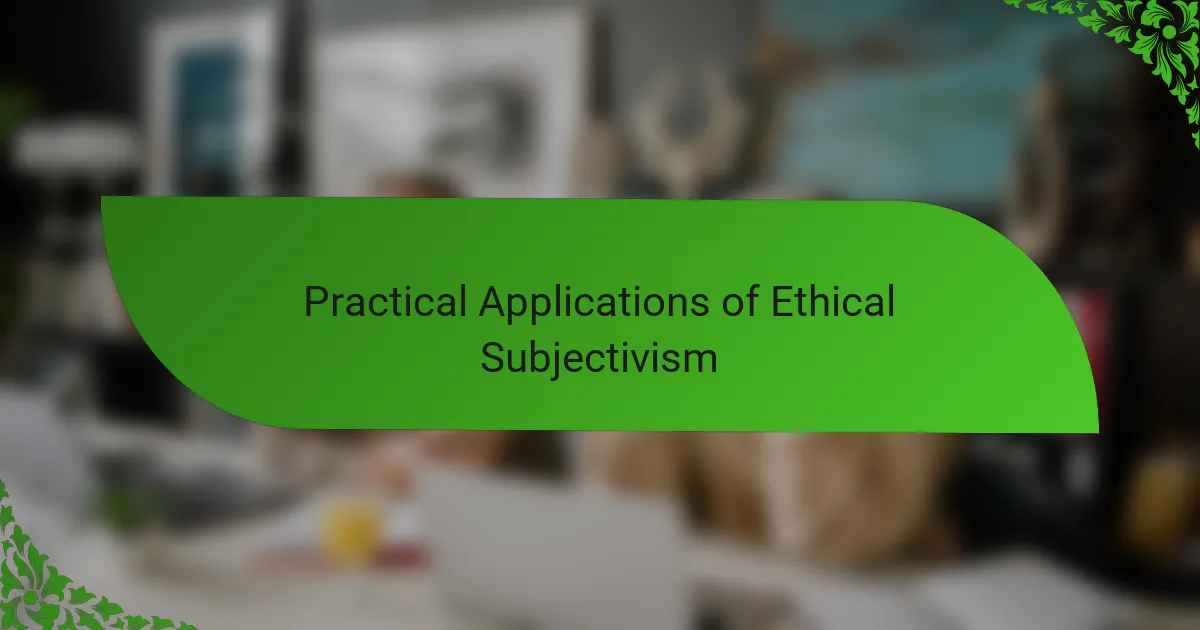
Practical Applications of Ethical Subjectivism
When I started thinking about ethical subjectivism’s practical applications, I realized how much it influences everyday decision-making. For instance, recognizing that others might hold different moral views based on their feelings encouraged me to approach disagreements with more empathy rather than trying to prove someone wrong. Have you ever found that simply acknowledging subjective perspectives can defuse tense conversations? That was a big takeaway for me.
I also found ethical subjectivism particularly relevant in multicultural settings, where diverse values come into play. Understanding that moral judgments aren’t one-size-fits-all helped me respect differences without feeling the need to enforce my own standards. This shift in mindset felt like unlocking a new level of tolerance and openness in both personal and professional relationships.
Interestingly, applying this theory made me reflect on how flexible our values can be depending on context. It raised the question: if our morals are shaped by individual attitudes, how do we navigate conflicting viewpoints in society? For me, this leads to emphasizing dialogue and mutual understanding as practical tools, rather than rigid rules. Have you ever noticed how conversations change when we prioritize feelings over fixed dogma?
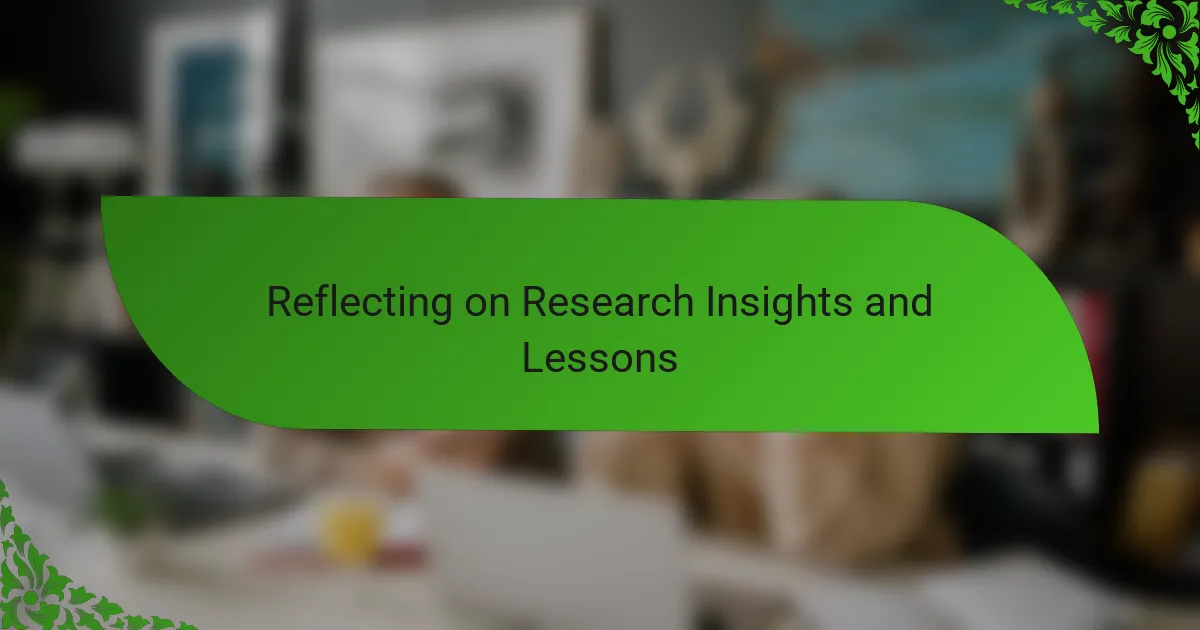
Reflecting on Research Insights and Lessons
Looking back on my research journey, I realize how much it reshaped my understanding of ethics. There were moments when I felt both frustrated and enlightened—frustrated because the answers weren’t clear-cut, but enlightened because that very ambiguity invited deeper reflection. Have you noticed how wrestling with uncertainty often sparks the most meaningful insights?
One lesson that stands out is the importance of patience and openness. At times, I had to pause and remind myself that ethical subjectivism isn’t about finding one right answer but appreciating the diversity of moral experiences. This mindset shift made me more receptive to perspectives I might have otherwise dismissed. How often do we give ourselves the space to genuinely consider a viewpoint that challenges our own?
Ultimately, I see ethical subjectivism not just as a theory but as a living conversation—one that requires ongoing curiosity and humility. Reflecting on these insights, I feel better equipped to navigate moral discussions with empathy and critical awareness. Has your own research ever transformed the way you engage with ideas and people? For me, that transformation was the biggest reward.